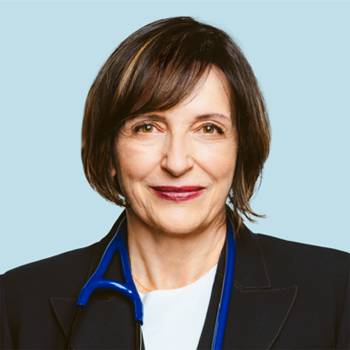CRISM Québec: Breaking barriers, bridging communities and transforming lives

A Canadian and international leader in addictions research, Dr. Julie Bruneau has worked decades towards one goal: to destigmatize substance use disorders.
"I don't see myself changing the world, but I think I'm contributing to change and moving things forward," says Dr. Bruneau, addiction medicine physician, professor and Canada Research Chair in addiction medicine at the Université de Montréal.
"Substance use disorder is one of the most common diseases in primary care, right alongside chronic illnesses like hypertension and diabetes, yet we continue to stigmatize patients. We must mainstream addiction."
From shared growth to independence
Dr. Bruneau is the Nominated Principal Investigator of the Québec node of the Canadian Research Initiative in Substance Matters (CRISM), a Canadian Institutes of Health Research (CIHR)-funded research network organized into five regional nodes.
Established in 2015, the story of CRISM's Québec node is one of evolution. It began as a node that encompassed both Québec and Atlantic Canada, with members from the five provinces working together to establish a strong research infrastructure. The node helped establish synergies, mentorships and collaborations between Québec researchers and the research teams in the Atlantic provinces.
"We grew together for the first six years, focusing on a common mandate as a group of researchers collaborating in different languages, from different communities including Indigenous communities, all working together to build bridges between the Atlantic provinces and Québec," explains Dr. Bruneau.
CRISM's first national trial, OPTIMA, comparing the effectiveness of two different models of care for the treatment of opioid use disorders, was overseen by the Québec-Atlantic node. Altogether, the trial and the node infrastructure helped lay the foundation for the five provinces to build research and clinical trial capacity, eventually leading to their independence.
Bringing francophone research to all of Canada
"Going from one node to two separate nodes means we're now aligned with other areas of the country on the national research scene and that is a priority for us," says Dr. Bruneau. "Québec is majority francophone and represents 22 percent of the population in Canada. When it comes to research we need to do more to ensure francophone researchers from Quebec and across the country are at the table."
Dr. Bruneau says one of the biggest challenges Québec researchers face is the lack of partnerships with other Canadian anglophone researchers. Language barriers result in francophone scientists working on groundbreaking research often collaborating with francophones internationally instead. Dr. Bruneau says CRISM is beginning to change that.
"We want to bring Québec to the rest of Canada. Québec researchers have a lot to contribute to the rest of the country, especially when we look at solutions around the opioid crisis. We need to ensure language is not a barrier when it comes to sharing knowledge and expertise. CRISM is starting to open that dialogue," says Dr. Bruneau.
"The Québec node has been proactive in making sure that everything that is done in CRISM is available in French and English and that francophone researchers from across the country are integrated in all CRISM projects. We need everyone to understand and share the incredible innovation that is being developed across all parts of this country."
Indigenous engagement driving a community approach
Dr. Bruneau says inclusivity and community connections are at the core of the Québec node's success. The node staff include people with living experiences and Indigenous Peoples. "We don't want tokenism. We don't want one person having the responsibility to represent a whole community at our table. We have an entire advisory committee of people with lived and living experience and organizations and community members on the front lines of addictions services, ready to offer their expertise whenever needed. Their input helps guide our research," emphasizes Dr. Bruneau.
"We've been collaborating with Indigenous working groups in Quebec and the Atlantic provinces since 2018. We continue to do so with our Atlantic node colleagues," adds Dr. Bruneau. "Indigenous communities are facing an array of circumstances, some defined by where they live, most defined by stigma and colonization. Our goal is to build capacity in Indigenous communities, and to understand and identify the opportunities for Indigenous-led research."
Strengthening research to dismantle the stigma
Part of CRISM's mandate is to invest in new and innovative research ideas through what's called the Research Development Program. The program matches community ideas with researchers or technical experts to secure funding and help get projects off the ground. "It's a mixture of seed money and mentorship to help build research capacity across Québec communities," explains Dr. Bruneau.
Dr. Bruneau believes an investment in evidence informed research can not only improve lives, but also drive policy. That starts, she says, with primary care.
"What we're facing now with the opioid crisis is the tip of the iceberg," Dr. Bruneau warns. "It's easier to solve an addiction issue if a patient feels comfortable to approach their nurse or family doctor at the beginning of their trajectory. I've spent my whole career advocating for more training for family physicians to identify addiction as a chronic illness."
"Through our evidence-based approach, we have trained many doctors who are now training other people, so we're making progress. But we need to change the mindset. We need to drop the stigma around addiction and substance use. That is the only way we're going to truly help people."
- Date modified: